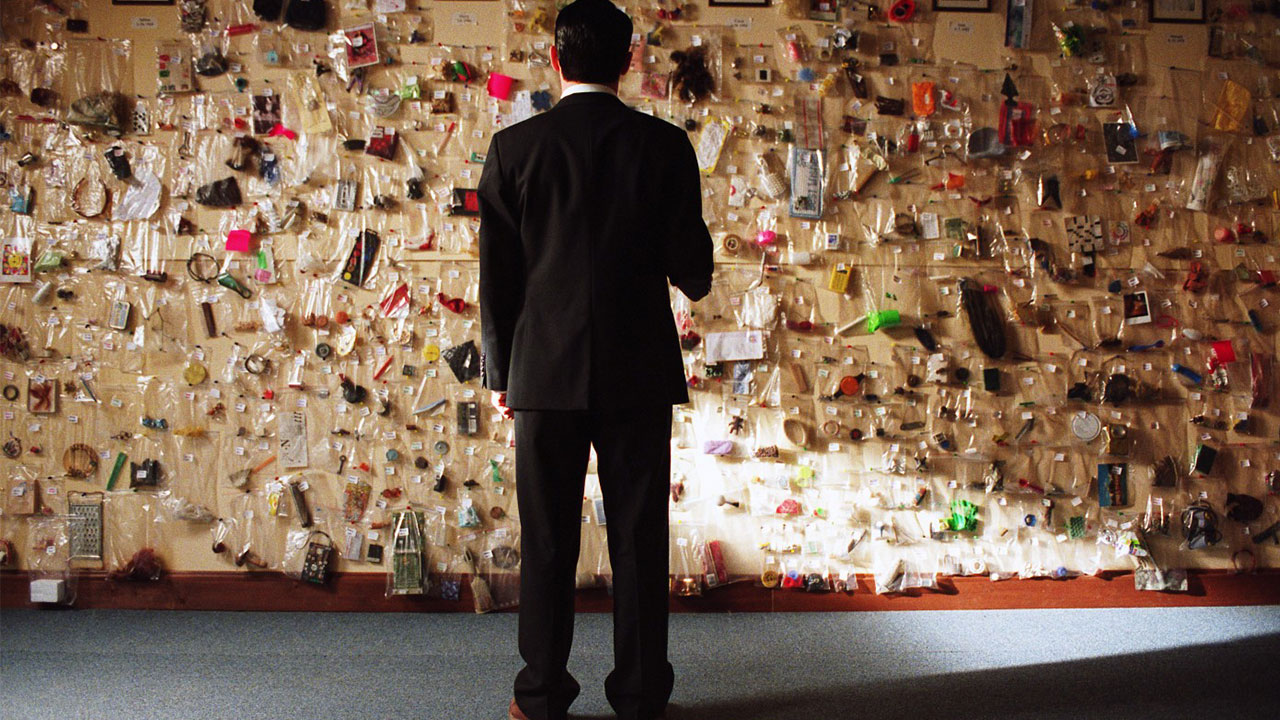
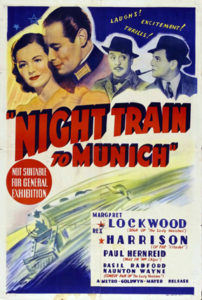 Early in Night Train to Munich (1940), Carol Reed’s crypto-remake of The Lady Vanishes (1938), the horrors of a concentration camp are briefly depicted, albeit in a somewhat ethnically equivocal context. Regardless, it is a historically significant moment, being perhaps the first such depiction of Nazi war crimes in narrative cinema—and during the early years of the war, no less. More clear-eyed representations of the Holocaust began to appear in the immediate aftermath of World War II, but portrayals of Nazi brutality in action were more prevalent than stories that dwelled on the post-war experiences of survivors.
Early in Night Train to Munich (1940), Carol Reed’s crypto-remake of The Lady Vanishes (1938), the horrors of a concentration camp are briefly depicted, albeit in a somewhat ethnically equivocal context. Regardless, it is a historically significant moment, being perhaps the first such depiction of Nazi war crimes in narrative cinema—and during the early years of the war, no less. More clear-eyed representations of the Holocaust began to appear in the immediate aftermath of World War II, but portrayals of Nazi brutality in action were more prevalent than stories that dwelled on the post-war experiences of survivors.
Regardless of cinematic merits, however, the pattern was set: Nazism itself would frequently prove a more appealing subject for narrative filmmakers than the vast historical aftershocks of the Reich’s pogroms. From time to time, however, producers apprehended the dramatic (and box-office) potential of survivor stories.
A few such survivor tales can be found among the German ‘rubble films’ of the late 1940s, such as Wolfgang Staudte’s Murderers Among Us (1946), and Herbert B. Fredersdorf’s pro-Zionist Long Is the Road (1949) (a work produced in part by the U.S. Army). Overall, however, socially- and psychologically-minded humanism often took a back seat to thrills, tragedy, and unambiguous, jackbooted villainy. The latter still resulted in some exceptional features in the immediate post-war years, including Orson Welles’ Nazi-in-hiding noir The Stranger (1946) and Czech director Alfréd Radok’s long-lost, artistically daring Distant Journey (1950). Regardless of cinematic merits, however, the pattern was set: Nazism itself would frequently prove a more appealing subject for narrative filmmakers than the vast historical aftershocks of the Reich’s pogroms.
From time to time, however, producers apprehended the dramatic (and box-office) potential of survivor stories. The films that resulted often reveal wider, prevailing attitudes towards the Holocaust, Jewishness, history, memory, and psychological trauma. This essay briefly examines six narrative feature films, one for each decade from the 1950s through the 2000s, unpacking the ways each work depicts Shoah survivors to achieve its thematic ends.
The Juggler (1953, USA, Dir. by Edward Dmytryk)
At first glance, the Israeli setting of Columbia Pictures’ The Juggler feels almost incidental to the film’s stark melodrama. With a change of window dressing, it could pass for any number of 1940s or 50s character studies about volatile, anguished outsiders. Kirk Douglas stars as Hans Müller, a once-renowned Jewish German vaudevillian who arrives in Haifa, Israel, with a multitude of refugees from Europe. Müller is superficially easy-going, a handsome jokester who delights in amusing children with juggling and ventriloquism. He also enjoys taking swipes at the mass of humankind with acerbic wisecracks and deadpan mockery. This cynical streak hints at Müller’s demons, as does a disturbing early scene in which he mistakes a stranger and her children for his own murdered family.
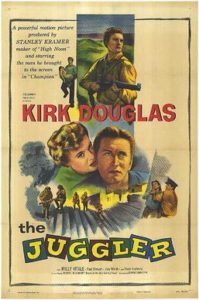
The newly minted Zionist state is in dire need of skilled tradesmen, and Müller’s ostensibly frivolous profession provides cover for his stubborn unwillingness to rejoin society. In truth, Müller is an utterly adrift man, haunted by unfathomable losses that distort his interactions with the surrounding world. He fearfully eyes concerned doctors and civilian police as though he were still in a concentration camp, seeing in them the perverse scientists and ruthless SS guards that once tortured him.
Douglas (born Issur Danielovitch) was of Belarusian Jewish heritage, and The Juggler often feels like a film that is working to reconcile its frank Jewishness with Hollywood idioms that (purportedly) transcended race, ethnicity, nationality, and religion.
The Juggler is essentially a fugitive tale: By the end of the film’s first act, Müller has assaulted a policeman and fled into the countryside. Posing as an aimless American tourist, he picks up an adolescent hanger-on in the form of Yehoshua (Joey Walsh), who is enamored with the man’s juggling skills. Eventually, Müller makes his way to a kibbutz near the Syrian border, where he finds temporary sanctuary and a potential love interest in the form of rifle-toting beauty Ya’El (Italian actress Milly Vitale). Meanwhile, Müller’s personal Javert, Detective Karni (Paul Stewart) tracks the fugitive across the Israeli landscape, gradually closing in on the kibbutz.
Narratively and formally, The Juggler is a capable, unexceptional feature, albeit one cast in the sturdy mold of innumerable classical Hollywood dramas: a lean story, well-told, with a genuine movie star at its center. Indeed, much of the film’s first-order appeal rests on Douglas’ rugged shoulders. His irresistible screen presence is the electricity that powers the story, as was usually the case when he had top billing. The film also offers an uncommon opportunity to marvel at the leading man’s impressive juggling and physical clowning skills.
If the explosive, dimpled star of Champion (1949), Along the Great Divide (1951), and The Bad and the Beautiful (1952) did not exactly fit American gentile filmgoers’ mental image of a Jew, this may have been partly the point. Douglas (born Issur Danielovitch) was of Belarusian Jewish heritage, and The Juggler often feels like a film that is working to reconcile its frank Jewishness with Hollywood idioms that (purportedly) transcended race, ethnicity, nationality, and religion. ‘Message film’ producer Stanley Kramer was cognizant of the historical significance of The Juggler, the first American film shot in Israel, and the first to depict the lives of both established and immigrant Jews in the new state. However, the film at times feels compromised by its determination to not alienate American goy with elements that might be regarded as excessively “Near Eastern.” It is a Jewish film that visibly exerts itself to be relatable to non-Jews.
The Juggler at times feels compromised by its determination to not alienate American goy with elements that might be regarded as excessively “Near Eastern.” It is a Jewish film that visibly exerts itself to be relatable to non-Jews.
What ultimately makes the film most distinctive is less its Israeli setting or modestly pro-Zionist stance than its depiction of a Holocaust survivor thoroughly undone by his horrific experiences. The Juggler presents Müller’s psychological agony in stark, even simplistic, terms, befitting a 1950s Hollywood drama. However, it also paints his tribulations as unabashedly ugly and pitiable in a way that brands the emotional trials of Holocaust survivors as a gritty, adult subject worthy of serious cinematic scrutiny. The Juggler’s often harrowing tone places the film snugly alongside the desolate, nervy box office hits that Columbia Pictures produced in the same period, such as From Here to Eternity (1953) and On the Waterfront (1954). Like those films, The Juggler is a broadly appealing feature that deals with bleak themes and tragic violence. Although not widely remembered today, it quietly placed the Holocaust into the canon of dark pasts that cinematic anti-heroes might claim, alongside bloody battles and tragic accidents.
The Pawnbroker (1964, USA, Dir. by Sidney Lumet)
One could regard The Pawnbroker as the film that takes the somewhat non-specific psychological anguish of The Juggler and amplifies it in an unmistakably Jewish-American context. The terrors of the Shoah scoured Hans Müller into a bundle of fight-or-flight impulses, but they have had the opposite effect on East Harlem pawnbroker Sol Nazerman (Rod Steiger). He has been reduced to an unfeeling, shuffling zombie of a man, who holds humanity in such low esteem that nothing seems to rile him. He responds to both chipper conversation and threats of violence with the same languid, pessimistic resignation, a demeanor that wordlessly expresses, “I expected as much.”
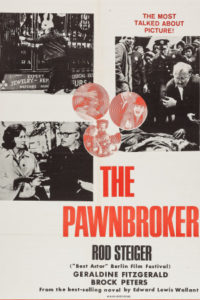
The Pawnbroker feels unmistakably of a piece with director Sidney Lumet’s later current of frazzled urban crime pictures, such as Serpico (1973), Dog Day Afternoon (1975), and Prince of the City (1981). Yet it also possesses a dose of the intense psychological intimacy that characterizes the director’s lesser-known tale of sexual jealously, The Appointment (1969). In The Pawnbroker, Lumet deftly balances two concerns. The film is, first, a character study of the stultified Nazerman, whose unflagging attitude of numb contempt is presented in contrast to the hyper-kinetic eagerness of his Puerto Rican assistant Jesus (Jaime Sánchez). Nazerman’s scars run so deep that he treats everyone—friendly neighbors, dejected family, menacing pimps, lonely and desperate customers—with the same unperturbed, fatalistic disdain. Given that his children were murdered and his wife was forced into sexual slavery in a concentration camp brothel, the pawnbroker’s deadened posture is more than understandable.
Nazerman’s scars run so deep that he treats everyone—friendly neighbors, dejected family, menacing pimps, lonely and desperate customers—with the same unperturbed, fatalistic disdain.
Despite its preoccupation with Nazerman’s head, the film is firmly embedded in the fabric of American urban life, and in the New York City of the 1960s specifically. Shot mainly on location, the film boasts Lumet’s characteristic attentiveness to the geometry of claustrophobic interior spaces, but also vérité-style exterior scenes that hum with authentic scuzziness. Lumet resolves these two strands—consuming psychological portraiture and a highly specific setting—by having Nazerman’s dreary city surroundings trigger his strobe-like flashbacks. A businessman receiving a shoe shine on the subway momentarily transforms into a Nazi officer. A teenager grasping a chain link fence elicits a memory of a prisoner’s hand against barbed wire. A pleading prostitute bearing her breasts invites flashes of Nazerman’s dead wife. For the traumatized pawnbroker, Faulkner’s line is apt: The past is never dead. It’s not even past.
Vitally, The Pawnbroker also wrestles with Jewish self-hatred in a way that seems bracing even today. In what eventually emerges as the feature’s most pivotal scene, Nazerman reacts with uncharacteristic anger to Jesus’s tactless query, “How come you people come to business so naturally?”
This interest in the stylized representation of a Shoah survivor’s harrowing inner life is what most immediately distinguishes The Pawnbroker. However, the film does not offer unrestrained sympathy for Nazerman. Its depiction of the way that survivor’s guilt can curdle into omni-directional misanthropy is thoroughly unsettling. In a scene that is echoed in Taxi Driver (1976), Nazerman responds to an accusation of racism with the chillingly calm, “Black, white, or yellow. They’re all equally scum.” Vitally, The Pawnbroker also wrestles with Jewish self-hatred in a way that seems bracing even today. In what eventually emerges as the feature’s most pivotal scene, Nazerman reacts with uncharacteristic anger to Jesus’s tactless query, “How come you people come to business so naturally?” Steiger launches into an agitated monologue that condenses the history of European Jewry into two terrifying, lacerating minutes of self-loathing. Few other actors or directors could have pulled off such an emotionally- and politically-charged high-wire act in any year, let alone in 1964.
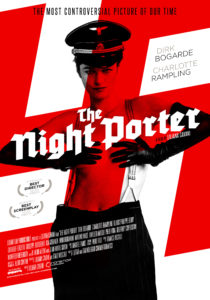 The Night Porter (1974, Italy, Dir. by Liliana Cavani)
The Night Porter (1974, Italy, Dir. by Liliana Cavani)
Of all the films considered here, director Lilian Cavani’s incendiary erotic thriller The Night Porter is the feature with the most sharply divided reputation. The film was widely pilloried by critics upon its release for its depiction of a doomed sadomasochistic relationship born from Holocaust horror. Roger Ebert famously described it as a “nasty” and “despicable” attempt at titillation via exploitation. Distributors AVCO Embassy Pictures were not unaware of how provocative the film’s subject matter would prove to be. The company marketed it in the United States with the tagline “The Most Controversial Picture of Our Time” and positioned it as the film that would up breeze past the limits of Euro-arty sexual transgression set by Last Tango in Paris (1972), directed by fellow emergent Italian filmmaker Bernardo Bertolucci.
Even today, The Night Porter is a difficult film, one that resists full-throated critical endorsement. Compared to the other films assessed in this essay, it depicts the Jewishness of its Holocaust survivor with disappointing caginess. It is implied that Lucia Atherton (Charlotte Rampling) was imprisoned in a concentration camp brothel for her Jewish heritage, but a conspicuous line of dialog indicates that her father was a prominent communist, suggesting instead that her captivity may have been punishment by proxy.
Even today, The Night Porter is a difficult film, one that resists full-throated critical endorsement. Compared to the other films assessed in this essay, it depicts the Jewishness of its Holocaust survivor with disappointing caginess.
In 1957, Lucia is the glamorous wife of a renowned American conductor. His touring has brought her to the Vienna hotel where Maximilian Aldorfer (Dick Bogarde) works as the titular night porter. Max, it turns out, is a former SS officer in hiding, and it was he who served as Lucia’s most prominent captor and rapist. In the twisted sexual unreality of the camp brothel, Max also viewed himself as Lucia’s protector, and for the sake of survival she readily catered to his frequently perverse whims.
Max and Lucia recognize one another when they cross paths in the hotel, and rather abruptly begin what can only be described as a profoundly screwed-up sadomasochistic love affair. Cavani intersperses scenes of their illicit and uncomfortably violent relationship with Max’s efforts to simultaneously outmaneuver a war crimes tribunal and shield Lucia from the snooping of his Nazi co-defendants. Max’s grizzled former SS colleagues insist that if Lucia turns up, Max is duty-bound to kill her, given that she would be able to identify them in court. Max, of course, fails to mention that he is currently having frenzied, kinky sex with the exact woman they are looking for. It will hardly come as a surprise that Lucia and Max’s affair is perilously unsustainable, or that it ultimately ends in tragedy for everyone involved.
Regardless of how bloody and twisted Lucia and Max’s sexual games become, Cavani apprehends that there is a risk that the viewer might be briefly lulled into regarding the characters as just another pair of star-crossed, consenting adults engaging in garden-variety BDSM play. To avert that possibility, she inserts numerous flashback sequences, which not only provide disturbing context for the warped events of the present, but also continually underline that the couple’s relationship is rooted in sexual slavery and racist genocide. Cavani’s approach is likely to keep even the most libertine, kink-friendly viewer continually squirming in their seat. Far from being glibly exploitative, she relentlessly pummels her audience with the mind-bending wrongness of what transpires between Lucia and Max. The film is undeniably charged with a fraught, fearless kind of eroticism, but nothing in it could be legitimately described as “sexy.”
“Never again!” insists the righteous political rallying cry, but Cavani’s film offers a grim alternative: “Again, always and forever.” This is not meant as a statement of ambition, but a despairing description of psychological reality; namely, that the Shoah recurs endlessly for its survivors.
The ugly fate that befalls Lucia and Max at the film’s conclusion points to The Night Porter’s pessimistic yet resigned view of the Holocaust as an inescapable state of being, at least for those individuals who lived through its carnage. “Never again!” insists the righteous political rallying cry, but Cavani’s film offers a grim alternative: “Again, always and forever.” This is not meant as a statement of ambition, but a despairing description of psychological reality; namely, that the Shoah recurs endlessly for its survivors. Although presented with the distinct erotic audacity of a 1970s Italian art film, this view is not that far afield from the one advanced by The Pawnbroker a decade prior. Unquestionably, there is a discernable subtext of radical sexual anarchy in The Night Porter: the loins want what the loins want, taboos be damned. However, compared to provocative, hyper-eroticized films like In the Realm of the Senses (1976) and The Stranger by the Lake (2013), Cavani’s interest in the messy reality of sex seems weirdly incidental.
 Enemies: A Love Story (1989, USA, Dir. by Paul Mazursky)
Enemies: A Love Story (1989, USA, Dir. by Paul Mazursky)
Whereas The Night Porter depicts a survivor whose erotic imagination is suddenly discombobulated by the resurfaced past, Enemies: A Love Story portrays a survivor whose entire life has been rendered a jumble of contradictory identities and impulses. During the war, Herman Broder (Ron Silver) escaped the worst horrors of the camps with the aid of Yadwiga (Malgorzata Zajaczkowska), the guileless daughter of a Polish farmer. Out of a mixture of genuine affection and gratitude, he eventually married Yadwiga and moved to America, settling on Coney Island in Brooklyn. At the film’s beginning in 1949, Yadwiga acts the part of the fawning, hard-working housemaid, attending to Herman’s every need with overbearing neediness. Desperate for his approval (and God’s), she is studying for her conversion to Judaism, partly in the hope that she will then be able to conceive a child.
As far as Yadwiga knows, Herman is a traveling book salesman, but in truth he acts as a ghostwriter for the worldly, garrulous Rabbi Lembeck (Alan King). Herman has another secret as well: He is engaged in a heated affair with fellow Holocaust survivor Masha (Lena Olin). She lives with her mother (Judith Malina), who approves of Herman, but only because, unlike Masha, she knows nothing of his goy wife. Masha is everything Yadwiga is not—confident, cultured, volatile—and Herman pledges to marry her the moment she divorces her estranged husband.
Through a melodramatic, lightly comic scenario of devotion and deception, Mazursky illustrates with surprising poignancy the way that traumatic events can create a contradictory mess of an individual’s life, not just in the moment, but for decades to come.
As if Herman is not juggling enough balls, a new twist emerges: Herman’s first wife Tamara (Angelica Huston), long assumed buried in a mass grave in the Old County, appears in New York. Their reunion, brokered by a well-meaning rabbi, sends Herman into an emotional and logistical tailspin that consumes the rest of the film. Memories of his and Tamara’s murdered children come flooding back, as does his attraction to his first wife. Meanwhile, his position with the other two women in his life becomes even more precarious, as Yadwiga announces that she is pregnant and Masha angrily demands that Herman make her a proper Jewish wife.
Compared to the films that precede it in this essay, Enemies is not a survivor story where despair over the past dominates the feature’s mood. It feels like an essentially 1980s film in the same way that The Night Porter resembles an archetypal 1970s feature: as warm, wistful, and affable as Cavani’s film is cruel, repellant, and dangerous. Director Paul Mazursky makes a visible effort to evoke nostalgia for New York City in the first half of the 20th-century, and for a certain vanished current of working class Jewish-American life. In this, the film resembles the director’s conception of a more sentimental Woody Allen feature, such as Stardust Memories (1980), The Purple Rose of Cairo (1985), or Radio Days (1987).
This is not to say that Enemies is bereft of psychological rawness, or the ghosts of Nazi brutality. Even prior to Tamara’s metaphorical resurrection, Herman’s dead children act as a thin, invisible wedge between him and Masha. The haunting presence compromises the bond that the couple have forged based on their passionate attraction, their intellectual tastes, and their shared experiences during the war. Tamara’s return only exacerbates this unhealed wound; the morning after the re-ignition of their sexual relationship, she and Herman weep together for their slain children, uncontrollably and unapologetically. Confounding matters further is the literal life-debt Herman owes to Yadwiga, whom he knows he has shamefully treated as a servant rather than as a spouse.
However, the aspect of Enemies that is most striking has less to do with Herman’s memories of the past than with the tragic way that past has snarled his needs, desires, and identity into a hopeless tangle of untenable lies. Through a melodramatic, lightly comic scenario of devotion and deception, Mazursky illustrates with surprising poignancy the way that traumatic events can create a contradictory mess of an individual’s life, not just in the moment, but for decades to come. The film asks which Herman is the Real Herman, but does not answer that query in a conventionally satisfactory way: The whole absurd jumble of lies is the Real Herman, since that is what the fleeting, gangrenous touch of the Shoah has made of him. Mazursky’s elegant handling of the material is crucial here, as is the oddly charismatic haplessness that Silver bestows on Herman. They deftly render the miserable schmuck as a victim figure, without every absolving him of responsibility for his negligence, dishonesty, and unfaithfulness.
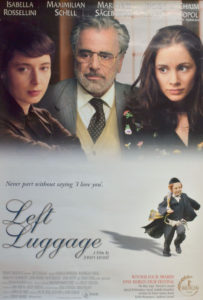
Left Luggage (1998, Netherlands, Dir. by Jeroen Krabbé)
Of the six features considered in this essay, Left Luggage (1998) is the film whose merits as a work of cinema are easiest to criticize. The directorial debut of prolific Dutch actor Jeroen Krabbé, it has all the markings of a narrative feature from a green filmmaker who wishes to convey an earnest message. It is didactic in a way that even a classical Hollywood melodrama such as The Juggler never stoops to, and it is saddled with a clunky screenplay and a broadly dreadful performance from its lead actress, Laura Fraser. (Some of this may be attributable to Krabbé’s strange decision to shoot his Amsterdam-set film in non-specific English, obliging the Scottish Fraser to compress her brogue down into a vague, incongruous Regency era accent.)
Even still, the film remains a worthwhile entry in the narrow subgenre of narrative features about post-war European Jewish life. Intriguingly, the film’s Holocaust survivors are effectively relegated to Left Luggage’s B Plot. Fraser portrays Chalya, who in the film’s urban 1970s Dutch setting lives the life of a typical liberated young woman, with a general disdain for tradition and a self-absorbed Marxist boyfriend. Her Jewish parents both escaped the Shoah, but deal with their wartime experiences in markedly divergent ways. Her mother (Marianne Sägebrecht) prefers not to dwell on the past or even speak of it, instead throwing herself wholly into her weaving and baking. Meanwhile, her father (Maximilian Schell) is obsessed with uncovering the location of the suitcases he once buried behind a house somewhere in Amsterdam four decades prior. These cases contain prized family possessions, but to Chalya’s father their worth has less to do with their monetary value than with their connection to a history that was severed by the Third Reich’s system of displacement, enslavement, and extermination.
At times, Left Luggage feels like a rather kludgy, barefaced attempt to educate secular Jewish viewers about the subtle beauty of the Hasidic subculture, and about the thinly-veiled anti-Semitism that still pervades contemporary European society.
The search for the titular luggage consumes Chalya’s father, creating a rift with his wife, who cannot comprehend why he persists in what is almost certainly a futile search. (The buried cases are likely to have been entombed beneath an expressway or a modern housing development.) This pointedly allegorical hunt for the remnants of a pre-war past is merely a secondary subplot in Left Luggage, although its metaphorical significance to the rest of the story is signaled by the film’s title.
Left Luggage is primarily concerned with Chalya’s relationship with a Hasidic family, the Kalmans, with whom she accepts a nanny position out of financial desperation. The dictatorial and humorless Mr. Kalman (director Krabbé) disapproves of her shamelessly secular presence in his household, but Chalya’s kind, passionate nature and rapport with the children gradually endear her to Mrs. Kalman (Isabella Rossellini). Indeed, Chalya’s friendship with four-year-old charmer Simcha (Adam Monty) coaxes the boy out of his mute shell, much to Mrs. Kalman’s pleasure. Naturally, Chalya eventually comes to appreciate the sober simplicity of the Hasidic way of life. The story ultimately concludes with a rather obnoxiously cheap tragedy, but not due to the Kalmans’ spiteful, violently anti-Semitic concierge (David Bradley), as the viewer is primed to expect.
At times, Left Luggage feels like a rather kludgy, barefaced attempt to educate secular Jewish viewers about the subtle beauty of the Hasidic subculture, and about the thinly-veiled anti-Semitism that still pervades contemporary European society. With respect to the former, the film possesses a definite streak of conservatism and religious apologism. However, Krabbé’s feature is memorable for the way it shifts attention to the first post-Shoah generation, and for its uncommonly generous stance towards the myriad ways that individuals and cultures deal with traumatic loss. Krabbé not only proffers Jewish religious tradition as an obvious bridge to the past, but also presents the coping methods pursued by both of Chalya’s parents as valid paths. The film ultimately dismisses neither the self-care-minded shunning of the past that her mother prefers, nor the active (albeit fruitless) pursuit of personal, tangible history that absorbs her father.
 Everything Is Illuminated (2005, USA, Liev Schreiber)
Everything Is Illuminated (2005, USA, Liev Schreiber)
In contrast with the relatively prosaic Left Luggage, the directorial debut of actor Liev Schreiber, Everything Is Illuminated (2005), is everything that a first film should aspire to be: self-assured, adventurous, impactful, and tonally complex. The feature follows neurotic American Jewish writer Jonathan Foer (Elijah Wood) on his quest to find Augustina, the woman who rescued his grandfather from the Holocaust. Their shetl (a fictionalized version of the real-world Tachimbrod) was liquidated by the Nazis, and Jonathan travels to Ukraine to track down any remaining traces of the village or his grandfather’s savior.
The bulk of the film is essentially an absurd travelogue. With Alex’s buoyant yet questionable guidance, the fretful Jonathan wanders a Ukrainian countryside of treacherous mud roads, crumbling Soviet edifices, and stony-faced locals who are incredulous over his vegetarianism.
Schreiber, who also adapted the screenplay from Foer’s pseudo-autobiographical novel, initially frames Jonathan’s quest in broadly comic terms, wherein the high-strung American bumbles his way through a strange land under the dubious direction of a pair of eccentric guides. Alex (Euguen Hutz) is a motor-mouthed, post-Soviet hustler straight out central casting, complete with track suit and a malapropism-laced obsession with American pop culture. He is unfailingly upbeat and gregarious, in contrast to his unnamed Grandfather (Boris Leskin), a taciturn grouch who doesn’t even bother to conceal his anti-Semitic views. Along for the ride is the Grandather’s “seeing-eye bitch,” the ill-humored Border Collie Sammy Davis Jr. Jr. (the second ‘Jr.’ a deliberate flourish).
Despite their mercenary cynicism, Alex and his Grandfather are inclined to assist Jonathan after learning of his family’s remarkable story. The bulk of the film is essentially an absurd travelogue. With Alex’s buoyant yet questionable guidance, the fretful Jonathan wanders a Ukrainian countryside of treacherous mud roads, crumbling Soviet edifices, and stony-faced locals who are incredulous over his vegetarianism. Eventually he finds Augustina’s sister, Lista (Laryssa Lauret), who reveals that her sibling is long dead, murdered for failing to renounce Judaism. The group also discover that Alex’s Grandfather is himself Jewish, having survived the Nazi pogroms by carefully concealing his heritage. In a whipsaw turn of events, the older man takes his own life based on this revelation, leaving Jonathan and Alex to mourn together for their respective grandfathers and the tribulations that they endured.
Although the film’s concluding shift into suicidal despair is a touch too jarring, Schreiber generally does a commendable job of juggling the various tones: quirky character comedy, ridiculous farce, stabbing melancholy, and defiantly Jewish self-deprecation. The remove provided by a 2000s setting certainly helps, but there is undeniable nimbleness evident in the way Everything Is Illuminated pulls off a difficult feat: a genuinely funny Holocaust film that never feels glib, ghoulish, or disrespectful. The screenplay has the telltale, polished weirdness of mid-1990s indie comedy, but Schreiber’s eye for memorable widescreen compositions and vivid, scrupulous, Wes Anderson-esque design marks it as 21st-century feature through and through.
There is undeniable nimbleness evident in the way Everything Is Illuminated pulls off a difficult feat: a genuinely funny Holocaust film that never feels glib, ghoulish, or disrespectful.
Everything Is Illuminated advances the story of the Holocaust’s black legacy another generation beyond the one depicted in Left Luggage. The grandchildren of Shoah survivors, whether anxious seekers like Jonathan or oblivious prodigals like Alex, are necessarily separated from their family’s past by a temporal gulf (and a spatial one, in Jonathan’s case). However, the Holocaust further widens this gulf through the eradication of not only people, but records, objects, and entire places. For Jonathan, and eventually for Alex as well, the incomprehensible scale of this tragedy is leavened by the fact of their own unlikely existence, the progeny of those who escaped. They are awed and humbled by this fact, even as Alex’s Grandfather is ultimately unable to reconcile the life he gained (not to mention a lifetime of anti-Semitic venom) with the necessary nullification of his religious and ethnic identity.
